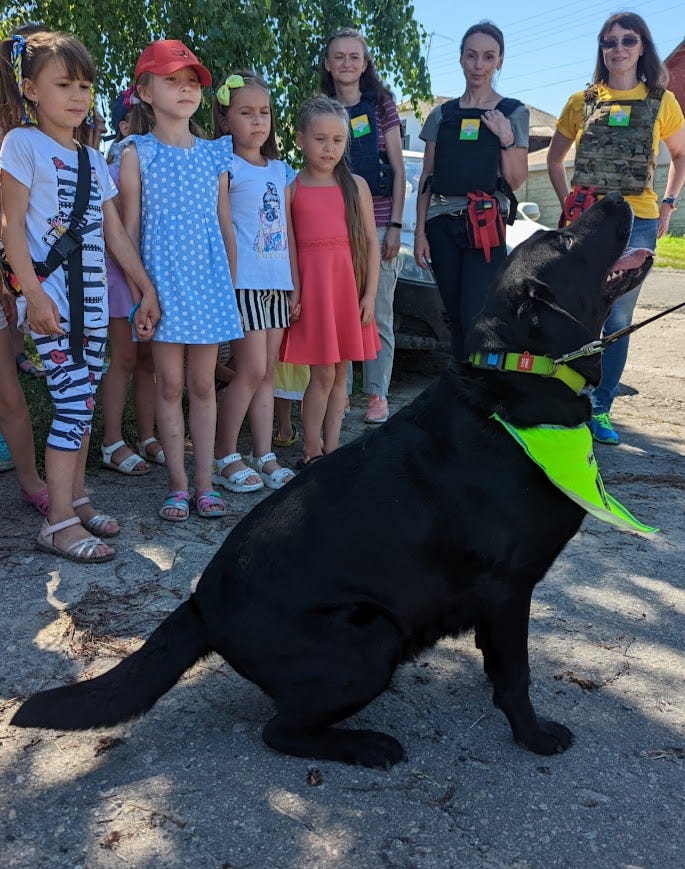War continues, but healing has begun for children in Kharkiv Oblast
A therapy dog makes a much needed visit to the village of Yakovlivka
(Please take a moment to sign up for the Trans at the Front subscriber list and share this site with your friends for an eyewitness view of the Russian war against Ukraine and politics and current events across the globe.)
Late June 2022 was a time of increased Russian terrorism against the residents of Kharkiv. That period which included the destruction of a hospital, a significant number of deaths, and dozens of injured, also bore witness to humanity in Ukraine once again shining brightly.
Tires bounced over the rock-hardened roads, kicking dirt up around the passing convoy leading into the tiny village of Yakovlivka. As the rolling hills dipped into a bucolic valley four vehicles from Kharkiv came to a rest outside of a small green space, one which doubled as both a park and a memorial to Ukraine’s victory over fascism in World War 2.
Dozens of onlookers had already gathered as the team of Ukrainian volunteers arrived. Kids jumped around, as babies cried in their mothers’ arms, and a few teens rode their bikes around the nearly deserted side streets. Still, as the group from Humanitarian Center Kharkiv, exited their cars and SUVs on the hot June day, all attention turned to the visitors, or at least one visitor in particular.
Rada had arrived.
Black, with a shiny coat, the friendly Labrador was immediately mobbed by the gangs of children, and reveled in the waves of attention, reciprocating with non-stop swipes of her tongue and continuous offerings of her paw.
The appearance by Rada and the rest of the visitors from the city of Kharkiv was part of a pilot program to bring therapy dogs to rural villages in Kharkiv Oblast which had been attacked by Russian terrorists and war criminals.
Organized by the “Kraken” civilian-military outreach arm, which operates according to NATO’s J9 standards, and in conjunction with the aforementioned Humanitarian Center of Kharkiv, the goal was to introduce the soothing, healing nature of the canine’s presence, with the message that the small hamlets sprinkled across Kharkiv Oblast have not been forgotten in the aftermath of the horror which Russia reigned down on them.
With more than three dozen homes destroyed, and a population of just around 1,000 inhabitants, Yakovlivka, suffered incredible losses to its infrastructure, along with the death of several residents. On the day of Rada’s visit though, the pain of the past was forgotten, at least for several hours.
Accompanied by her trainer, Petr, a psychologist with expertise in juvenile therapy, Rada dutifully sat by Petr’s feet as he explained the nuances of why Rada was such an exceptional animal. After running the children through several exercises, including having them extoll positive traits in each other, the kids lined up to give Rada a treat.
On the other side of the park, available for less structured fun, was another dog, this belonging to Igor, one of the members of the Kraken. Arma, whose reddish coat and more carefree style endeared him to the crowd as well, roamed around looking to play with everyone in attendance.
Once their time with Rada and Arma finished, the festivities didn’t end. Ice cream, cookies, and candy, provided were passed out, followed by medical supplies and hygiene products.
Eventually, as the crowds thinned, group members were taken on tours of the destroyed village, before departing however, one Babushka insisted on showing off a curious aspect of the war monument that sat near Petr’s presentation.
“Those names on the stone belong to Ukrainians, but the biggest name, the one above, is Russian. These people have been trying to take our credit and our memory for 80 years.”
Familiar devastation awaited the party, as they passed bombed-out wreckage and razed homes visible in every direction, the lasting reminder of war crimes carried out by Putin’s terrorists.
One young girl insisted on a visit to her home. There her mother, Anna, the village’s lone English teacher, discussed the repairs that were being done to the family’s home, along with noting how badly damaged the town’s only school was.
In the midst of the conversation, she noted just how isolated the villagers were. “We have one bus a week that goes to Merefa, other than that, most people are stuck here. It’s not unusual to run out of things like soap for clothes, but we have our food, and we have Ukraine.”
Upon leaving, as a reminder of how true her words were, and how hopeful the future was for this village, Anna’s mother and daughter picked and bagged fresh cherries, grown on the fertile land outside the house.
Arriving back in the city, at the headquarters of the Humanitarian Center Kharkiv, the dogs went home, and the volunteers ate their own ice cream, gushing over the smiles they witnessed, and knowing they would certainly see similar ones on their next trip through the Oblast’s countryside.
(As a freelance journalist and war reporter, I rely on you, the reader, to help me bring eyewitness news to the world. Please help me continue to publish Trans at the Front by contributing through PayPal, Patreon, Cash App, or Venmo.)








Very warm-hearted article! We need such feelings now even more than ever before to stay human during the war.
Great article, the people interviewed will stay with me for a long time. Babushka’s words reverberate, we have Ukraine is a beautiful thing to say. Kraken ‘s work is amazing.